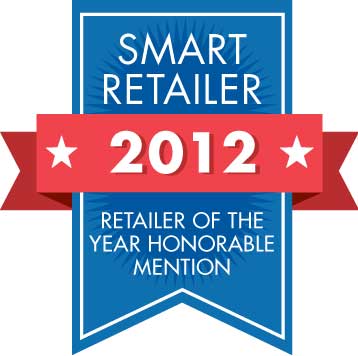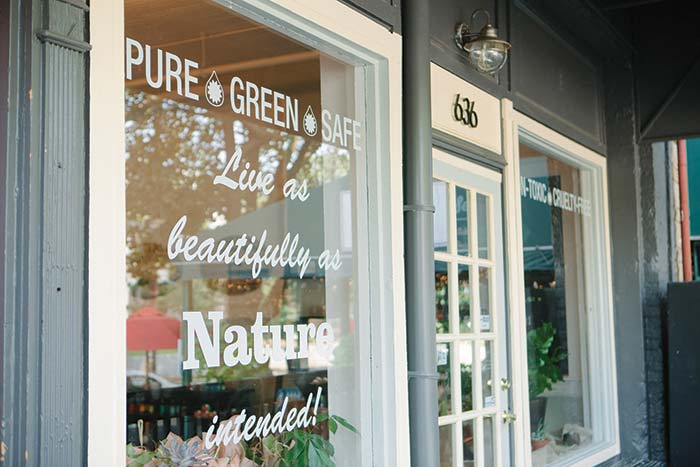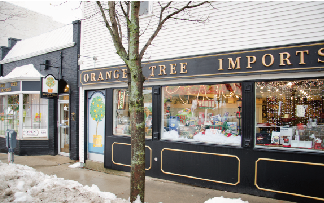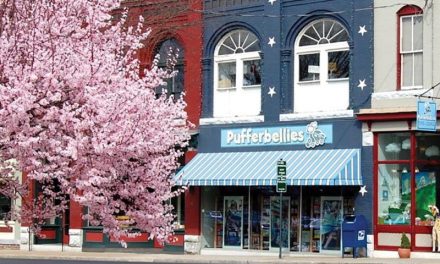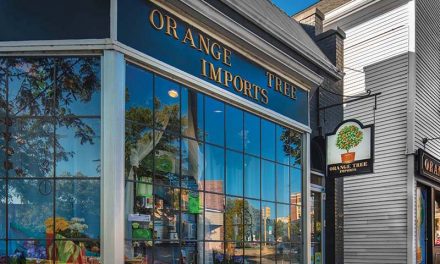These four retailers—entrepreneurs at heart—come from different parts of the country and disparate backgrounds. Some gravitated to the retail industry from the start. Others came into store ownership from other, seemingly unrelated, experiences. What they have in common is a creative vision, a willingness to take risks, dedication to their business and employees, and, in the end, a sheer love of what they do.
Lexie’s Trading Post
When asked what sets her store apart, Karen Crook of Lexie’s Trading Post in Louisville, Kentucky, doesn’t hesitate. “We listen to our customers. It’s as simple as that,” she declares.
That answer may be general in nature, but Crook really gets specific when it comes to meeting customer needs, whether they are looking for a perfect accessory or gift or something for themselves. One area where the store excels is its homemade bath and body products, many of which have originated from shopper suggestions. “We often introduce a new product based on customer feedback. We recently came up with a new hair milk after a woman told us we should make something for hair. I did some research on it, and 10 recipes later, we had it,” recalls Crook, citing another example of a man who came in and told her he liked the scent of cloves, then was surprised and pleased when Crook later developed a special clove-fragranced soap.
Recently, the bath and body products at her shop have garnered attention in other ways. “This area is big in recycling, and the local councilwomen even started a program called The Green Triangle to get residents thinking about ways they can recycle better. We listened, and we started our refill section,” says Crook.
Through that program, customers can keep their containers and simply bring them back to be refilled, helping reduce waste and save money, since refills cost less than new containers. “Our customers save $2–$4 on every refill, depending on the size and product. We even have one guy come in with a mason jar for his pet wash,” she remarks.
Crook’s previous life skills have prepared her well for her current role as a retailer. She spent time in the military, including an assignment at a nuclear facility, which taught her important lessons about fortitude, responsibility and how to successfully work with and for others. In college, she studied biology and chemistry, disciplines that she has come to use when formulating so many different bath and body products. “People will ask me how I make things like lotions, lip balms and soaps. I always relate it back to having the right combination of ingredients in the right proportion and having it all come together.”
Like, one might say, owning a unique retail business.
The Weathervane Museum Store at Landis Valley Village and Farm Museum
As any retailer can attest, supporting the local economy has taken on greater importance in recent years. That underlying approach to doing business has defined The Weathervane Museum Store in Lancaster, Pennsylvania, and, along the way, its incredibly dedicated and canny manager, Mary Parelli.
For example, when the economy plummeted in 2008, Parelli and others at the museum store looked for opportunities that worked for both the shop and the community at large. “We started taking in more merchandise on consignment. We pay the consignor once it is sold, so we were able to completely fill a two-story Victorian with merchandise without paying up front,” she explains.
It was evident right away that the shop had hit on something successful. “It works for everyone—our customer, the consignor and us,” Parelli says.
The store also supports the local economy in another pivotal way by showcasing the works of artisans in and near the community. “People in this area know these artisans now personally or at least know them by name,” Parelli points out. Recent examples include potters who specialize in redware pieces and fabric artists who create custom textiles, including a line that features hand-dyed yarn crafted from the wool of sheep on a nearby farm.
Carrying products from nearby artisans also draws the attention of the many tourists that pass through Lancaster each year. While on their travels, those tourists are looking for something unique that will serve as a reminder of their trip or as a thoughtful gift for someone back home. The products at The Weathervane provide that, says Parelli.
Earrings crafted by a local tinsmith, for example, tend to fly off the shelf when tourist groups composed of seniors visit the shop because they are both unique and affordable at $6 a pair. “We need to keep things small and meaningful for these types of customers, and the earrings are one way to do that. Broaches are another, as are scarves and mittens—all of those personal items really do well,” says Parelli.
Parelli, who owned her own store for 15 years before lending her talent to The Weathervane Museum Store four years ago, says that the focus on consignment and artisan-made pieces has served the shop well. “I’m happy to say that business has been good,” she notes.
45th Parallel
Britani Holloway-Pascarella and Philip Pascarella’s shop is in a geographically distinctive location: halfway between the equator and the north pole in Perry, Maine. And just as this site is a point of interest and significance, so, too, is the store they have created together over the past 14 years.
It was on a vacation to Maine that Chicago natives Britani Holloway-Pascarella and Phillip Pascarella fell in love with the area and decided to follow their dreams, naming their shop after the notable 45th parallel locale. “Our tiny town is well known for this auspicious fact. An official stone marker that dates back to the 1880s is located just yards from our store,” notes Holloway-Pascarella.
Befitting its map-worthy name, 45th Parallel includes merchandise that the couple has sourced internationally. “By shopping around the globe, we try to make the shopping experience fun for everyone,” explains Holloway-Pascarella.
With its eclectic offerings that include furniture and home accents, accessories, gifts and jewelry, and with eye-catching and often bold displays, the shop reflects the artistic talent of the proprietors. If it seems like the surroundings have been thoughtfully fashioned with various materials to create a work that looks different from every perspective, the fact that Pascarella has a background in sculpture has something to do with it.
A graduate of the Art Institute of Chicago, he has lent his sculptural artistry to the shop in many ways, such as transforming two 6-foot iron buoy balls into “earths” that flank the store, complete with copper continents. A true artist, he is continually creating, according to his wife. “This winter, Philip is completing a project that includes over 10 wood life-size tree silhouettes that will adorn the porch,” she says.
Also setting this shop apart is its owners’ absolute presence. They set up a cash/wrap area at the front of the store so they can greet everyone who walks in and out. “Another unique feature of our store is that we still hand-write all receipts. This gives us time to talk with each customer and give them the attention they deserve,” explains Holloway-Pascarella.
They are able to keep an eye on the store at all times because they actually live in the building, too. And, ultimately, their own relationship has helped fuel the shop’s success. “Being a husband-and-wife team adds to our strength,” notes Holloway-Pascarella.
Santoro & Company
What do you get when you combine antiques, gifts and home furnishings; a hair salon; a yoga room and a psychology practice—all under one roof? A highly successful, award-winning retail venture.
Joseph Santoro, who founded Santoro & Company in Bridgeton, New Jersey, in 1996, didn’t just carve out a niche for his shop, he carefully and creatively whittled that niche into something truly special. Although Santoro recently closed the doors of his beloved shop in order to move across the country, the business will always be known for its distinctive identity.
“They called us an oasis in the middle of nowhere,” Santoro says, adding that the eclectic business shared the rural landscape’s rolling hills with grazing cows.
In all seriousness, though, Santoro says he is proud that he, along with his trusted manager, Michael Bohannon, had built something so different and well received. “When you had color in your hair, you could go shop,” he points out, noting that shoppers appreciated the chance to be pampered and served.
As a hairdresser, Santoro trained at Vidal Sassoon in London and at another academy in Italy. His creativity naturally flowed from hairstyles to retail displays. At his store, he would often create memorable settings with a wide range of merchandise, thanks, in part, to his lifelong interest in antiques and home decor.
Through the years, Santoro & Company was able to survive the ups and downs by finding new ways to build business and meet local consumers’ needs. “When I started feeling it, I learned to be more Internet savvy, and I started on eBay, doing it after work,” Santoro says. He also expanded his work helping local residents liquidate their estates.
Although Santoro and his partner, the psychologist whose practice was an integral part of the business, are moving west to Arizona, he is likely to stay in the home decor environment that he loves. “I am not retiring. I want to rep a line,” he declares. He says that he is looking for an opportunity to sell home furnishings in a way that, again, combines his knack for finding a niche and taking it to the next level.
Nevertheless, closing Santoro & Company after more than 15 years is emotional, not only for its owner but its customers as well. “It was a thriving store, and there was nothing like it,” says Santoro.


